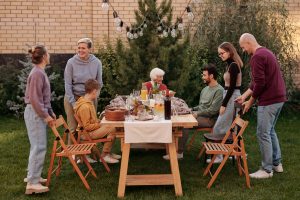Navigating public spaces can be difficult for seniors. Unfortunately, a lot of public buildings aren’t built with seniors in mind, and many areas can be overstimulating, and sometimes even unsafe for someone with limited mobility or sensory issues. Many seniors are also navigating entire new cities or neighbors as well, since it’s common for those over 65 to move into a retirement residence or closer to family as their health declines. This adds a completely new set of challenges as they explore areas they’re unfamiliar with on top of any physical and mental limitations they might have.
The following is a list of suggestions for what to consider when exploring a new space that could be useful to both seniors and loved ones who are looking to help make this transition easier.
Health Considerations
When planning an outing it’s important to take the health needs of the senior into consideration. Many seniors are more susceptible to illness, and might struggle to fight off colds and flus. That’s why it’s important to think about things such as temperature and air ventilation when visiting public spaces. It might be wise to pack an extra sweater if it’s cold, or a portable fan when it’s the middle of summer. Perhaps a well-fitting mask might be a good choice in a crowded area. You could also inquire as to what the cleaning policies are, and asking whether or not the building you’re going to monitors air quality is also a good practice to help keep your loved one safe. Regardless of whether or not someone has a pre-existing condition, it’s never pleasant to be sick, so taking preventative measures, and only visiting spaces where it feels like they’re being as safe as possible can help protect against more serious illnesses and protect the mental health of your loved one.
Public Transportation
Public transportation is a great way for a senior to be able to have some independence, especially if they’ve recently moved into supported living, or are recovering from an injury. Getting a handle on the transit system can also be a great way to get to know a new city. However, while taking transit can be incredibly fun and beneficial for seniors, there are some elements that can be tricky to navigate, so it’s important to talk through any potential issues that might come up, so everyone is prepared.
One of the first things you’ll want to think about is accessibility. Most buses and trains have accessible seating, but it’s a good idea to run through where everything is situated and how to handle anything like support straps for wheelchairs. It’s also good to know when something should be handled by a rider versus the driver of a vehicle. Some buses might have ramps or a lowering feature, so it’s helpful if seniors know when they might need to ask for a particular service, as someone’s needs are not always obvious just by looking at them.
Something else to consider when thinking about transit is making sure your loved one understands the payment and transfer system. Every city is different, so while tickets might be a great option in one place, it could be a payment card or an app in another. Don’t forget to see what is available for seniors in your area, as many cities offer great discounts to those over 65 who ride on the transit system!
Finally, if a senior you know is embarking on their first trip, make sure they understand the different routes and schedules of the transit in their city. Understanding the bus schedule might be tricky at first, but after a bit of practice it’ll be a breeze!
Getting to know the transit system can transform a senior’s life and drastically improve their mental health. It’s well worth the effort to get to know how to navigate the public transportation system in their area.
Signage
Something that not a lot of people think about when navigating public spaces is how clear the signage is in the city you live in. Some cities have confusing street signs, or the signs that are available but not in a font that’s large enough for someone with failing eyesight. That’s something you’ll want to keep in mind when your loved one is exploring a new space. Because, even if you run through the bus schedule and make a firm plan, unexpected things are going to happen. A bus might short turn, or your loved one might simply go the wrong way down a street. Can you be certain that they’ll be able to find their way back to where they’re supposed to be? Will they be able to read the street signs, or are there businesses nearby who will be able to help? This leads into another important point…
Technology
Technology evolves at a rapid pace, and it can be difficult for seniors to keep up. But, the reality is technology is a reality of our world, and it’s important that seniors be able to navigate phones, tablets and computers to be able to access important tools such as maps and online counseling. There are many simple apps for seniors that can help improve their autonomy and mental health, so it’s well worth taking the time to make sure they understand it. Most devices also come with handy tools for seniors, such as voice to text applications, or the ability to make fonts larger and easier to read.
Tech is not only important for use at home, but most seniors will be faced with it when navigating a new city as well. Many museums and recreation centers feature technology that can help newcomers orient themselves in the space, so it’s important seniors understand how to use these devices.
Safety
While many people might not think twice about going to a new place, the safe design of a building or outdoor area is a very important consideration for seniors in a new environment. Something like a fall could have a life-changing impact on a senior, and could result in long-term mental health consequences, so it’s important to consider some of the following when visiting a new place.
- Surface traction – smooth surfaces like hardwood or marble might look beautiful, but they can be slippery! You should always think about the traction of a surface when travelling with a senior and ways to mitigate any issues. This might mean the addition of a walking aid, or perhaps a sturdier pair of shoes with good grip on the bottom. A senior’s therapist might have great suggestions on adjustments to make in this area. Don’t forget that surfaces can change with the weather. Pavement might have good traction when it’s sunny, but become much more hazardous after it rains. Always be prepared.
- Steps/ramp gradients – if your loved one struggles on stairs or uses a wheelchair or other mobility device, you’ll want to check that the location you’re visiting can accommodate their needs. Some businesses claim to be accessible but don’t actually have the appropriate systems in place, so it’s always good practice to check before visiting.
- Railings – sometimes railings can make all the difference. Check in to see if the location you’re visiting has railings along ramps, walkways and in their bathrooms.
- Adequate seating – your loved one might be able to make it up steps, but struggle to stay standing for long periods of time. If that’s the case you’ll want to make sure that wherever you’re visiting has adequate seating available. There’s nothing more frustrating than going to a concert or museum and then realizing there’s nowhere to sit!
Visiting a new place can trigger a lot of anxiety in seniors, so the more you can prepare them for what to expect, the more comfortable they’ll feel when they arrive. Plus, it will be comforting for you to know that your loved one is going to be safe and well-cared for wherever they go.
Sensory Triggers
Many people can get easily overstimulated in crowds. While sometimes these triggers can be managed in therapy by targeting mental health issues such as depression and anxiety, for many it is simply a way of life. While sometimes this overstimulation is unavoidable, there are many preventative measures that can be taken that can make exploring new spaces a much more enjoyable experience.
Some of the biggest sensory triggers are sound, light and people. So something like a festival or a firework display might be upsetting for someone who struggles with overstimulation. However, it’s not just major events that can be triggering. Sometimes going to the mall or visiting a grocery store can do the exact same thing. This doesn’t mean your loved one can’t go anywhere, but it means that they might want to be thoughtful about the spaces they visit and whether or not it might be overstimulating for them.
Thankfully, more and more people are becoming aware of this issue and taking steps to address it. Some shops now offer sensory-friendly hours, with no music, dimmed lighting and limits on the amount of guests. Some theaters also offer sensory-friendly shows, where there are warnings before any loud effects, the lights are not kept all the way down, and the mics are not as loud. Along with sensory-friendly hours, some grocery stores also have senior specific shopping times available and their stores. This might not specifically cater to sensory issues, but given the limitations on who can visit during those hours, it’s almost guaranteed to be quieter, and, with fewer people, the risk of getting sick is also greatly reduced.
Of course, the most important thing is knowing the needs of the senior in question. Just because someone is older does not mean that they like things quiet! For some with sensory issues, they might need to have constant music or some sort of distraction. And for others, there might be no sensory issues at all, and they want to be right in the thick of things! Don’t write off a music festival just because your loved one has gotten older. They might want to rock out to the latest rock song, too!
Interests
Lastly, but certainly not least, what are the interests of the senior in question? While navigating a new area might be stressful, it will be a whole lot easier if your loved one is getting to participate in activities they enjoy. If they don’t have hobbies already, that’s not a problem, there are many ways to start. Check in with a senior center or seniors counselor to find out what is available in your area. Hobbies can be incredibly beneficial for the mental health of seniors, and can help keep them active and mentally engaged.
Many senior centers offer activities such as exercise classes and educational presentations, but they can also help point you in the direction of centers that can provide other services. Maybe your loved one has always wanted to learn how to make a perfect fettuccine alfredo, or has been eyeing the pickleball court. There is no shortage of great hobbies to pick up in your golden years, and there are also many clubs that offer support for hobbies that someone might have had for a long time. This is also a great way to make new friends of all ages when you move to a new area. A new best friend might be waiting at a knitting club or in that wood carving workshop.
Getting to a senior center or a club location is also a great way to test out those public transportation and technology skills that were mentioned earlier!
At the end of the day, all of the above is about keeping seniors vital and active, but remember, new experiences can be nerve wracking, so be patient and make sure you and your loved one take all the time you need. Sometimes just getting out of the door can be the hardest part of starting something new.
Not everything will go right the first time, so be prepared for some missteps. But, the more you get out there, the easier it will get. Plus, you’ll get more familiar with how things work as you go. At first, understanding what to expect from an accessible building or a sensory-friendly grocery hour will be difficult, but once you’ve experienced a few you’ll have a much better understanding and will also be well-equipped to ask the right questions in the future.
On a final note, the world isn’t perfect (yet), but you can help make it better! If there’s something that you think could change for the better in a public space, why not reach out to someone about changing it? It might not always happen, but it’s always worth a shot. If adding a railing to a bathroom or adding a couple of chairs to a museum could make that space more comfortable for future visitors a business owner might really respond well to that feedback. So, don’t be afraid to speak up for what you or a loved one needs. It could help make public spaces more enjoyable for everyone.
And remember, there are many qualified mental health senior’s counselors and therapists who are always happy to talk through any of these challenges online or over the phone at any time.








